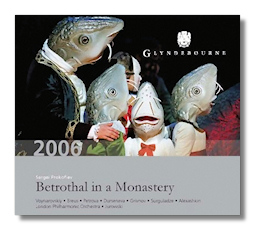
The Internet's Premier Classical Music Source
Related Links
- Prokofieff Reviews
- Latest Reviews
- More Reviews
-
By Composer
-
Collections
DVD & Blu-ray
Books
Concert Reviews
Articles/Interviews
Software
Audio
Search Amazon
Recommended Links
Site News
 CD Review
CD Review
Serge Prokofieff

Betrothal in a Monastery
- Viascheslav Voynarovskiy - Don Jerome
- Andrey Breus - Ferdinand
- Lyubov Petrova - Louisa
- Alexandra Durseneva - The Duenna
- Vsevolod Grivnov - Don Antonio
- Nino Surguladze - Clara
- Sergei Alexashkin - Mendoza
- Alan Opie - Don Carlos
The Glyndebourne Chorus
London Philharmonic Orchestra/Vladimir Jurowski
Glyndebourne Festival Opera GFOCD002-06 2CDs
There have been four recordings of Prokofieff's comic opera masterpiece Betrothal in a Monastery: the original entry was from conductor Kemal Abdullayev and singers and chorus of the Stanislavsky Theater on the Soviet enterprise Mezhdunarodnaya Kniga, issued on its Melodiya label in the 1960s; the second, also on Melodiya, was led by Alexander Lazarev with Bolshoi forces, from 1990; and the third was the 1998 Gergiev/Kirov on Philips (which featured the young Anna Netrebko as Luisa, no less). This is the fourth recording of this splendid and still underrated opera, and the first complete effort from non-Russian producers (but the lead singers are mostly Russian.) There was also a German recording of excerpts from the opera led by Herbert Kegel, originally issued, I believe, in the 1980s. What's interesting here is a look at the timings of the four complete recordings:
| Abdullayev | 2 hrs. 27 mins. |
| Lazarev | 2 hrs. 34 mins. |
| Gergiev | 2 hrs. 33 mins. |
| Jurowski | 2 hrs. 15 mins. |
As the reader can clearly see, the Jurowski is the fastest by far, and what's significant about this observation is that the other conductors, especially Abdullayev, were not exactly slouches in tempo selections. Young Vladimir Jurowski is the son of the Mikhail Jurowski, the Germany-based former Soviet conductor who has been recording a ton of mostly lesser known Prokofieff for the CPO and Capriccio labels. Vladimir Jurowski delivers one of the most spirited readings of this score one could imagine: his tempos are quick, to be sure, but never quite sound rushed. Only the closing number, where Don Jerome "plays" wine glasses and sings his pronouncements at virtuosic speed, do things ever come close to sounding over-the-top. As far as conducting goes, I'd have to give the edge to Jurowski, the director of the Glyndebourne Festival since 2002. But what about the singers, you ask?
The best Don Jerome was Abdullayev's, Nikolai Korchunov, and the best Luisa was also his, Valentina Kaevchenko, though the more I listen to Netrebko, I realize she is also quite excellent. The finest Duenna was Gergiev's, Larissa Diadkova, who almost steals the show. All the singers on the Glyndebourne recording here turn in fine work, with Lyubov Petrova as Luisa and Viacheslav Voynarovsky as Don Jerome especially fine. If there is a drawback to the Glyndebourne recording it is the sound quality: the orchestra has excellent presence, as do the singers most of the time; but since this is a live recording (as was the Gergiev), there are moments when singers seem to move away from the microphone, tipping the soundstage toward an imbalance of sorts. Try the Act III duet (Scene 7; CD 2: track 10) between Luisa and Antonio, where Luisa and Antonio seem to fade a little too soon into the background. But this is a relatively minor quibble, since the sound of the singers is generally quite fine throughout.
The opera was derived from three live performances, given on August 12, 15 and 22, 2006. The audiences present during the performances were obviously pleased both by the singers and orchestra, as well as by Prokofieff's music and humor (there is much laughter and applause throughout). Commentary across the internet consistently suggests that this opera ought to be more popular, owing to its infectious melodies and sparkling wit. The story is a clever complex of mix-ups and mishaps, based on the Richard Brinsley Sheridan play The Duenna. In any event, this is a splendid recording that is fully competitive with the Gergiev and Abdullayev efforts. Strongly recommended.
Copyright © 2008 by Robert Cummings




















